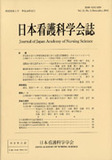Japanese
English
- 販売していません
- Abstract 文献概要
- 参考文献 Reference
- サイト内被引用 Cited by
要旨
本研究は,脳血管障害をもつ病者の家族がどのように生活を再構築していっているかを明らかにすることで,家族援助指針を提案することを目的とした.
脳血管障害と診断された病者の配偶者で,病者と同居あるいは入院前まで同居していた11名を対象に,半構成的面接法によりデータを収集し,質的分析を行った.
分析の結果,家族の生活の再構築を形作る局面として【状況の定義】【家族の知恵】【家族の見通し】【再構築の行動】という4つの局面が抽出された.【家族の知恵】とは,病者を抱えた生活の中で培ってきた経験や知識に根ざした,家族独自に備わり,発展し,修練されていく技であり,〔介護のマネジメントに関わる家族の知恵〕,〔状況の構えをもつことに関わる家族の知恵〕,〔継続性を保つことに関わる家族の知恵〕,〔関係性を深化させていくことに関わる家族の知恵〕の4つのカテゴリーが明らかになった.看護への示唆として,家族の生活の再構築を支援する家族援助の視点を導いた.
Abstract
The purpose of this study was to examine the processes of reconstructing life in families with stroke patients, and to propose guidelines for family support. The sample comprised 11 spouses of stroke patients, living with their spouses either physically or nominally if the patient was still in hospital. Data was collected using interviews. Following qualitative analysis of data, 4 phases of life reconstruction in families were extracted: 1) definition of the situation; 2) the wisdom of families; 3) family prospects; and 4) reconstruction behaviors.
The wisdom of families represented skills originating with and developed by the family, based in the experiences and knowledge cultivated from life with stroke patients, and developing constantly. The wisdom of families includes the following 4 core items: 1) management of caregiving; 2) shaping attitudes towards the current situation; 3) maintaining family identity; and 4) deepening relationships.
When families with stroke patients struggle to reconstruct family life, supporting the wisdom of families for family nursing appears important.
Copyright © 2002, Japan Academy of Nursing Science. All rights reserved.


